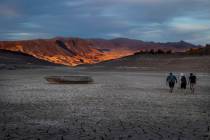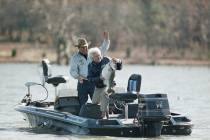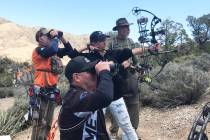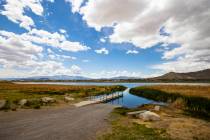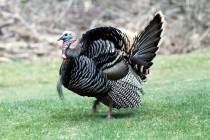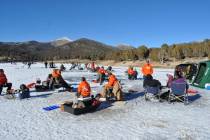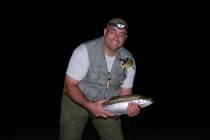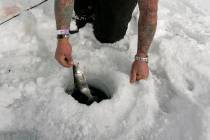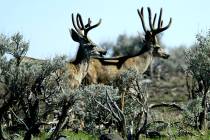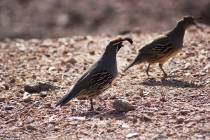Big catch gives fish story happier ending
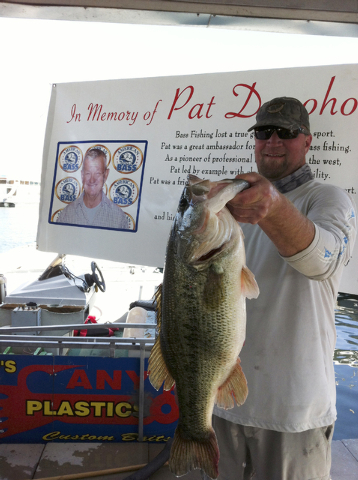
There is no shortage of tall tales on the bookshelves of fishing lore. Perhaps the most common are stories about the ones that got away, and they are probably the most frequently updated. Not far behind are big-fish stories followed by tales of precious time spent with special people, but among my favorites are those that combine reality with humor to create a picture of the near miraculous.
Such is the latest big-fish story from the waters of Lake Mead.
On Saturday, Henderson resident Chris Bozarth and his fishing partner Curtis Easter joined a collection of bass anglers who came together for the Pat Donoho Memorial Tournament organized by the American Bass Association. While catching fish was definitely on the agenda at the second annual event, the purpose of the tournament is to pay tribute not only to its namesake, the late Pat Donoho, but also “all of our fishing friends that have passed in the last year.”
Donoho, a longtime Las Vegas resident, was a popular participant in the world of competitive bass fishing.
Bozarth and Easter opted to begin their day by working Lake Mead’s Boulder Basin and found success right away. Then somewhere along the line, Easter threw a spinnerbait fitted with a swimbait trailer into a likely looking spot near a line of brush. Suddenly a large bass came out of the dark and short-bit the bait, ripping the trailer off.
“He just kneeled down and told me to throw up there,” said Bozarth of his partner. “I saw the boil, and even Curtis said it looked like a Jet Ski went through there. I threw a Texas rigged worm with 15-pound test, and the fish didn’t bite. And I picked up the drop shot, she bit it, and it was on after that.”
The duo had been talking about “the one” all morning. After missing the fish, Easter told Bozarth, “This is the one.” But when the fish hit, Bozarth wasn’t so sure. “It was just a couple of little bumps. It was a couple of taps. It didn’t feel like a big fish.”
Then Bozarth set the hook and the fish ran for deep water. That’s when he took over the trolling motor and began the chase. Meanwhile, Easter grabbed the net, took a standing position next to his friend, and prepared to bring the fish aboard when the time was right. By now the fish had shown herself and Bozarth knew it was big, just not how big.
Suddenly the fish turned and made a run back toward the boat. Bozarth gave the trolling motor some juice and the unthinkable happened. “The front of the boat went left. Curtis went right. Right into the lake. I am not kidding,” Bozarth said.
Even before Easter hit the water, Bozarth already had visions of “telling this story later of how we lost the big one.” And Easter’s unplanned swim made the feeling of uncertainty even worse, especially since Bozarth was using only 6-pound test.
Somehow Easter managed to tread water with the net in hand while doing all he could to keep Bozarth’s fishing line from catching on his shoes. Eventually the fish and Easter both tired but still managed to get the net under it. At one point he was so close to the fish that he later said, “I thought about bear-hugging it.”
When the pair finally brought the fish aboard, they realized it was hooked near the corner of its mouth, but the hook hadn’t penetrated the skin. In fact, when Easter went to pull the hook, it simply fell out. It would seem that the successful catch was a bit of a miracle.
Bozarth’s bass tipped the scales at nearly 9.8 pounds, not a Lake Mead record, but definitely one for the books. The fish measured 23.25 inches in length, had a girth of 18 inches and is the largest bass Bozarth has caught to date. He credits Easter with giving him the fish when he could have given the fish another try after replacing the lost swimbait trailer.
The duo took third place with a five-fish bag weighing 24.13 pounds, a huge bag for Lake Mead but almost 4 pounds behind Kona Borja and Joe Coarasa who took first with an amazing bag of 27.86 pounds. Joe Rafferty and Tom Martin came in second with 26.39 pounds.
Who says there are no fish in Lake Mead?
Freelance writer Doug Nielsen is a conservation educator for the Nevada Department of Wildlife. His “In the Outdoors” column, published Thursday in the Las Vegas Review-Journal, is not affiliated with or endorsed by the NDOW. Any opinions he states in his column are his own. He can be reached at intheoutdoorslv@gmail.com.



